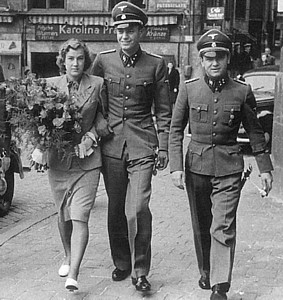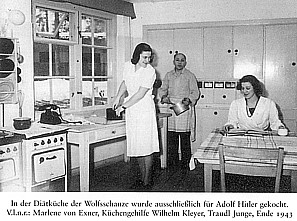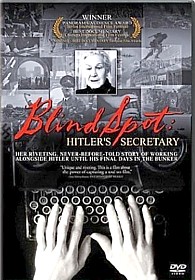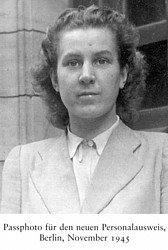Essay (back
to top)
Coming to Terms with Your Savior, a Mass Murderer
It is 1945, and Germany has lost World War II. The German people must
rebuild their war-torn nation, and in the process they must deal with
the realization that they stood by and watched as millions of people were
unceremoniously killed. Traudl Junge was Hitlerís personal secretary for
the last two and a half years of the Third Reich. In Jungeís memoir, "Until
the Final Hour," Junge portrays her close relationship to the Fuhrer
up until he committed suicide in his bunker. Even though Junge claimed
that she was not an avid Nazi, or greatly involved with politics, she
still adored and respected Hitler very much. The experiences that Junge
encountered, from her adoration for Hitler to the guilt that she felt
postwar, represents the sentiment of the majority of Germans. However,
unlike many Germans who tried to claim that they were victimized under
the Nazi regime, Junge took responsibility with her involvement with Hitler.
She never pitied herself. As a result, the unforgiving compunction that
Junge developed plagued her for the rest of her life. Other Germans wanted
to ignore the past and the Third Reich altogether.
In her memoir, Junge explained that she was not aware of the millions
of people who were being executed at the hands of Hitlerís men because
she was isolated in the bunker. She stated, "That never occurred
to us at the time, and isolated from the experience of other Germans,
we accepted as normal our not only very privileged but our entirely abnormal
life." Perhaps Junge was not aware of Hitlerís crimes, but she was
present while he was dictating his speeches to her, and in many of his
speeches he expressed contempt for Jews, and other people of "Non-Aryan"
descent. The myth of ignorance was a common German reaction to their involvement
with the war. The "we didnít know," myth, turned to "we
donít want to know" (Marcuse 01/25/06).

Traudl with Hans and best man after wedding |
Germans chose not to know because they did not want to come to terms
with the crimes they had committed. Also, by portraying the myth of ignorance,
it lifted some of the blame that Germans did not want to have on their
conscience. Junge claims that she was not aware of Hitlerís atrocities.
But Melissa Muller, the editor of Jungeís memoir says that Junge probably
did not know the extent of the persecution of Jews because she did not
want to know (Muller 218). Junge stated, "Most of the time I try
to sleep, to take my mind off of bitter memories of the past and anxiety
about the future" (Junge 227). Junge also tried to relieve her guilt
by believing the excuses that people made for her, such as "But you
were so young at that time," or "There was nothing that you
could have done under Hitlerís power. These excuses kept her somewhat
at ease up until the 1960s. The 60s was the generation that confronted
their grandparents about their involvement in the past. Her memories haunt
her, but she still tries to ignore them.
Unfortunately, the Holocaust cannot be forgotten. For many Germans like
Traudl Junge and Professor Mahlendorf, the guilt for what they were a
part of grew as they got older. Junge went through many years of depression.
It was only at her death where she barely started to forgive herself.
Professor Mahlendorf also had to go through many years of therapy to help
forgive herself for her role during the Nazi regime. As she expressed
in her lecture, the older she gets, the harder it is to live with what
she had done. The notion that many Germans did not want to know what had
happened during the Nazi regime shows that during denazification, Germans
were renazifying Germany by ignoring the situation at hand. Moreover,
Germans did not talk a lot about the Holocaust. They went on with their
daily lives, trying to suppress their guilt. It is important to note that
Germany was quiet about the Holocaust after the war because there were
not that many Jewish people alive or living in Germany to tell their stories.
Most Jews had fled or were killed in the concentration camps.
Furthermore, another myth that Germans used to justify their involvement
with the Nazi regime was the myth of being victims to the Allies, and
people who wanted money to pay for their grievances. Germans claimed that
they were victims of a totalitarian government.
Another myth that Germans used as their reaction to the war was the myth
of resistanceóthey resisted as much as they could under a totalitarian
government. Hitler had total power, if they rebelled; they put their lives
in danger. Therefore, they did as much as they could to resist the Nazi
regime. Later, Germans felt that in terms of resistance, most Germans
already know enough about the atrocities and now they need to clean up
the sites. Germans wanted to forget about the testimonials of the survivors
because they felt that it was not important. They wanted to just forget
about everything that happened. Forgetting seems like an easy way out,
but as the tragedies of the Holocaust were more revealed in the 1960s,
Germans could not simply forget about it (Mahlendorf 02/16/06).
Finally, the last myth was the myth of victimizationóthe "good Germans"
were victims of "Bad Nazis. (Marcuse 01/25/06). Hitler had instilled
a notion into German minds that Germany can only thrive by National Socialism.
This idea is expressed when Frau Goebbels, the wife of Joseph Goebbels
who is Hitlerís Propaganda Minister, says that she would rather commit
suicide than live in a world that was not ruled by National Socialism.
She also ended up killing her six children once she realized that Germany
had lost the war. Even after the war, Germans felt that they were victimized
by Allied troops who celebrated their victory on German land. They also
felt like they were victimized by tourists who would always remind them
of the atrocities during World War II.
 |
After the Nazi regime came to an end, Junge had to deal with the fact
that her Fuhrer was responsible for killing millions of people, and for
the downfall of her nation. Like many people, Junge had a magnetic-like
attraction towards Hitler. Mainly because Hitler held a great deal of
power, and at the same time, he had two sides to his character. Around
Junge, Hitler had a charming, caring, and paternalistic behavior. He always
made sure that she was fine and had everything that she needed while in
his company. For Germany as a whole, he was also portrayed as a paternal
figure that would take care of Germany. Therefore, it was very hard for
Germans to come to terms with Hitlerís end. Many were in denial even decades
after the war was over. Germans took on one of the three myths mentioned
previously as well.
Most of the Jews had either died during the war or left Germany. There
were very few Jews still living in Germany in 1945, so there was little
contact between Jews and Germans (Mahlendorf). There was such a small
number of Jews in Germany that the first time that Mahlendorf personally
met a Jew was when she came to the United States as a Fulbright student
in 1951. After learning about the concentration camps and racism during
the war she felt ashamed around them.
Germany was so brainwashed with Hitlerís hatred for Jews and people who
were not Aryan that the reversal of ideology was a difficult task. As
the Nazi regime was coming to an end, there had been some realizations
that the regime had been lying to the German people. For Professor Mahlendorf,
her reversal of ideology occurred during her high school years. From witnessing
the Nuremberg trials, comparing constitutions, and learning from her teachers
who were never affiliated with the Nazis, Mahlendorfís ideology had been
reversed. But for the most of the German population, it would take the
1960s for the reversal of ideology to occur. Postwar, Germany attempted
to make amends by paying reparations to Israel and Jewish families. However,
the racism was still very prevalent in Germany. As portrayed in "Invisible
Woman," Ika experienced a brutal amount of racism and discrimination
in her lifetime for being half black. Nevertheless, Germany definitely
has a very complex past that many Germans today have to still live with.
Junge describes in her memoir that she felt betrayed because Hitler made
Germans believe that they were superior to everyone else and that she
always felt safe under his paternalistic demeanor. However, a new light
was shed in her life when she became close with the Lanzenstiel family
in the 1960s who never got involved with the NSDAP. She learned tolerance
and acceptance from them because they accepted her no matter what. The
mother of the family, Luise Lanzenstiel made Junge feel comfortable at
a time when Junge wanted to "hide from the rest of the world"
(Muller 246). Junge feels safe with the Lanzenstiel family.
Naturally, the men and women who had a direct involvement with the Nazi
regime are at fault. However, it is everyone who participated in anti-Semitism
for whatever personal reason to accept the burden of the past and work
hard to make sure that events like that will never occur again. Even though
Junge never committed any crimes herself under the Third Reich, she still
feels guilty for not having enough self-confidence to speak out against
the Regime. Junge took responsibility for her involvement in the regime,
which is the first step towards forgiving herself. Traudl Jungeís memoir
exhibited the influence and hold that Hitler had on the German people
during World War II. Hitler and his menís last days in the Bunker is a
reminder of how strident political beliefs can take over an entire country.
Eventually, these beliefs led to Hitlerís suicide.
|



